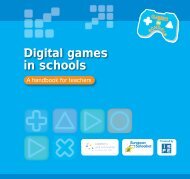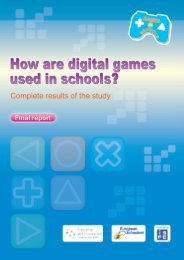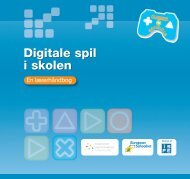Quels usages pour les jeux électroniques en classe ? - Games in ...
Quels usages pour les jeux électroniques en classe ? - Games in ...
Quels usages pour les jeux électroniques en classe ? - Games in ...
Create successful ePaper yourself
Turn your PDF publications into a flip-book with our unique Google optimized e-Paper software.
Gibbs, N., & Roche, T. (1999). The Columb<strong>in</strong>e Tapes. Time, 154, 40-51.<br />
Gottfried, B. (2005). Us<strong>in</strong>g sharperbra<strong>in</strong>, a computer-assisted program, to treat att<strong>en</strong>tion deficit disorders<br />
(ad/hd) and learn<strong>in</strong>g disabilities (ld): Review of 3 case studies. Retrieved 1 March, 2007, from<br />
http://www.sharperprograms.com/Cases-SB.html<br />
Gre<strong>en</strong>, C., & Bavelier, D. (2003). Action video game modifies visual att<strong>en</strong>tion. Nature, 423, 534-37.<br />
Griffiths, M. (2005). Video games and health. British Medical Journal, 331(7509), 122-23.<br />
Heil, M., & Agnew, B. (2000). The effects of previous computer experi<strong>en</strong>ce on air traffic-selection and tra<strong>in</strong><strong>in</strong>g<br />
(at-sat) test performance (No. DOT/FAA/AM-00/12). Oklahoma City: Civil aeromedical <strong>in</strong>stitute.<br />
Jaquith J (1996). The role of short term memory on academic achievem<strong>en</strong>t. Retrieved May 2007 from<br />
http://www.nacd.org<br />
Joyner, L., & TerKeurst, J. (2003). Account<strong>in</strong>g for user needs and motivations <strong>in</strong> game design. Paper<br />
pres<strong>en</strong>ted at the 1st Global Confer<strong>en</strong>ce <strong>in</strong> Interactive Converg<strong>en</strong>ce: Research <strong>in</strong> Multimedia,<br />
Prague, Czech Republic.<br />
Kearney, P. (2005). Cognitive callisth<strong>en</strong>ics: Do fps computer games <strong>en</strong>hance the player's cognitive abilities?<br />
Paper pres<strong>en</strong>ted at the DiGRA 2005 Chang<strong>in</strong>g Views: Worlds <strong>in</strong> Play International Confer<strong>en</strong>ce,<br />
Vancouver, Canada.<br />
Kearney, P. R. (2006). Immersive <strong>en</strong>vironm<strong>en</strong>ts: What can we learn from commercial computer games? In<br />
M. Pivec (Ed.), Affective and emotional aspects of human-computer <strong>in</strong>teraction: Emphasis on<br />
game-based and <strong>in</strong>novative learn<strong>in</strong>g approaches. Amsterdam: IOS Press BV.<br />
Kearney, P. & Pivec, M. (2007a). Recursive loops of game based learn<strong>in</strong>g. In Proceed<strong>in</strong>gs of World<br />
Confer<strong>en</strong>ce on Educational Multimedia, Hypermedia and telecommunications 2007 Vancouver<br />
BC, Canada, 2007, pp. 2546-53<br />
Kearney, P. & Pivec, M. (2007b). Immersed and how? That is the question. <strong>Games</strong> <strong>in</strong> Action. Goth<strong>en</strong>burg,<br />
Swed<strong>en</strong>.<br />
Kearney, P. & Pivec, M. (2007c). Sex, Lies and Videogames. British Journal of Education Technology, Vol.<br />
38, Issue 3, May 2007<br />
Kelly, H. (2005). <strong>Games</strong>, cookies, and the future of education. Issues <strong>in</strong> Sci<strong>en</strong>ce & Technology, 21(4), 33-40<br />
Klawe, M. M., & Phillips, E. (1995). A classroom study: Electronic games <strong>en</strong>gage childr<strong>en</strong> as researchers.<br />
Paper pres<strong>en</strong>ted at the CSCL 1995, Bloom<strong>in</strong>gton, Indiana.<br />
Kl<strong>in</strong>gberg, T., Forssberg, H., & Westerberg, H. (2002). Tra<strong>in</strong><strong>in</strong>g of work<strong>in</strong>g memory <strong>in</strong> childr<strong>en</strong> with ADHD.<br />
Journal of Cl<strong>in</strong>ical & Experim<strong>en</strong>tal Neuropsychology, 24, 781-91.<br />
Klopfer, E. (2008). Augm<strong>en</strong>ted Learn<strong>in</strong>g; Research and Design of Mobile Educational <strong>Games</strong>.<br />
Massachusetts: The MIT Press.<br />
Ko, S. (2002). An empirical analysis of childr<strong>en</strong>'s th<strong>in</strong>k<strong>in</strong>g and learn<strong>in</strong>g <strong>in</strong> a computer game context.<br />
Educational Psychology, 22(2), 219-33.<br />
Kolb, D. (1984). Experi<strong>en</strong>tial learn<strong>in</strong>g: experi<strong>en</strong>ce as the source of learn<strong>in</strong>g and developm<strong>en</strong>t. Englewood<br />
Cliffs, N.J: Pr<strong>en</strong>tice-Hall.<br />
Kovalik, L.M., & Kovalik, D. (2008) A <strong>les</strong>son learned through gam<strong>in</strong>g. Simulation & Gam<strong>in</strong>g. An<br />
Interdiscipl<strong>in</strong>ary Journal of Theory, Practice and Research. 29 (1), 118-25<br />
157






